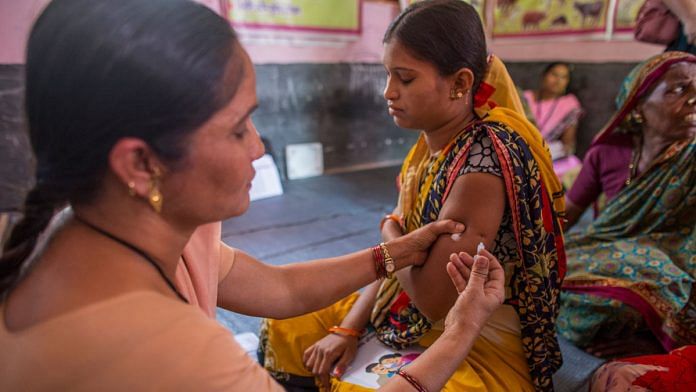New Delhi: Beneficiaries of the Modi government’s flagship maternity benefit scheme are now having to contend with a serious stumbling block — women are eligible for a portion of the government cash transfer only if their husbands have Aadhaar cards.
Under the Pradhan Mantri Matru Vandana Yojana (PMMVY), launched in 2017, the government transfers cash worth Rs 5,000 to women of 19 years or above for their first live birth. The money is transferred in three instalments — the first of Rs 1,000 on the registration of the pregnancy, the second of Rs 2,000 after six months of pregnancy and the third instalment of Rs 2,000 after childbirth.
“The Aadhaar details have to be provided for both the beneficiary and her husband,” a senior official in the Ministry of Women and Child Development (WCD), which oversees the scheme, told ThePrint.
“The third instalment is contingent on the submission of the Aadhaar details of the husband, since the woman’s Aadhaar card details are already reviewed before the first installment,” the official added. “This means until and unless the woman submits her husband’s Aadhaar card, she will not be given the third installment.”
According to NGOs working on the ground, many potential beneficiaries of the scheme are being left out because of their inability to provide their husband’s Aadhaar card details — either because they don’t have husbands or their husbands don’t have Aadhaar cards.
“Women often struggle even if their husbands have Aadhaar cards,” Kirani Ekka, who works with the Chaupal Sanstha NGO in Chhattisgarh, told ThePrint. “If her own Aadhaar card was made prior to marriage, it won’t have her husband’s address and that card is often not accepted.”
Ekka adds that a lot of times, authorities ask for the husband’s Aadhaar card for the first instalment itself. “As a result many women who could really benefit from the scheme have been left out,” she said.
Also read: Too soon to celebrate Modi govt’s sex ratio claim, wait for 2021 census, say experts
The scheme
The cash transfer is meant to compensate for any wage loss that an expectant mother may have experienced during pregnancy and childcare.
It is not only the third instalment that, NGOs said, is proving to be a stumbling block.
Economist Reetika Khera, who has studied the implementation of maternity entitlement schemes in the country, including PMMVY, says the scheme is exclusionary in many other ways.
“The paperwork to apply for benefits of the scheme is daunting. The submission of her own Aadhaar number as well as her husband’s is just one of the problems,” she said.
“Some states insist that the address on the Aadhaar card has to be that of her sasural (in-laws house), not her maika (parental home). This is often not the case as these are first-time mothers, who get pregnant soon after getting married,” Khera told ThePrint.
“This is a significant flaw given that the benefits of the PMMVY are only given to the first child,” said Khera, who had conducted a survey on PMMVY beneficiaries in five states — Chhattisgarh, Odisha, Uttar Pradesh, Madhya Pradesh and Himachal Pradesh.
“The scheme is designed to knock out as many people as possible, and Aadhaar comes very handy in doing this.”
She, instead, wants the central government to replicate Odisha’s maternity entitlement scheme, Mamata, which does not require a woman to submit her husband’s Aadhaar or even show her marital status.
The scheme, launched in 2011, also ensures Rs 5,000 to expectant mothers in two instalments.
“The Mamata scheme isn’t restricted to married women, nor to the first child as PMMVY does,” Khera said. “Unwed mothers, single women are entitled to Mamata benefits.”
‘Ministry will consider changing clause if cases pile up’
The WCD ministry now says it may consider changing the Aadhaar clause if the complaints pile up.
“One or two states have orally communicated that there were some potential beneficiaries who couldn’t avail the cash transfer because they didn’t have husbands or their husbands didn’t have Aadhaars,” Monideepa Mukherjee, WCD spokesperson told ThePrint. “But the ministry hasn’t received a large number of complaints from any state,” she added.
“But if a large number of such cases are reported by any state, then the ministry will certainly amend the requirements.”
Also read: Women & child development ministry gets a promotion with outspoken Smriti Irani



